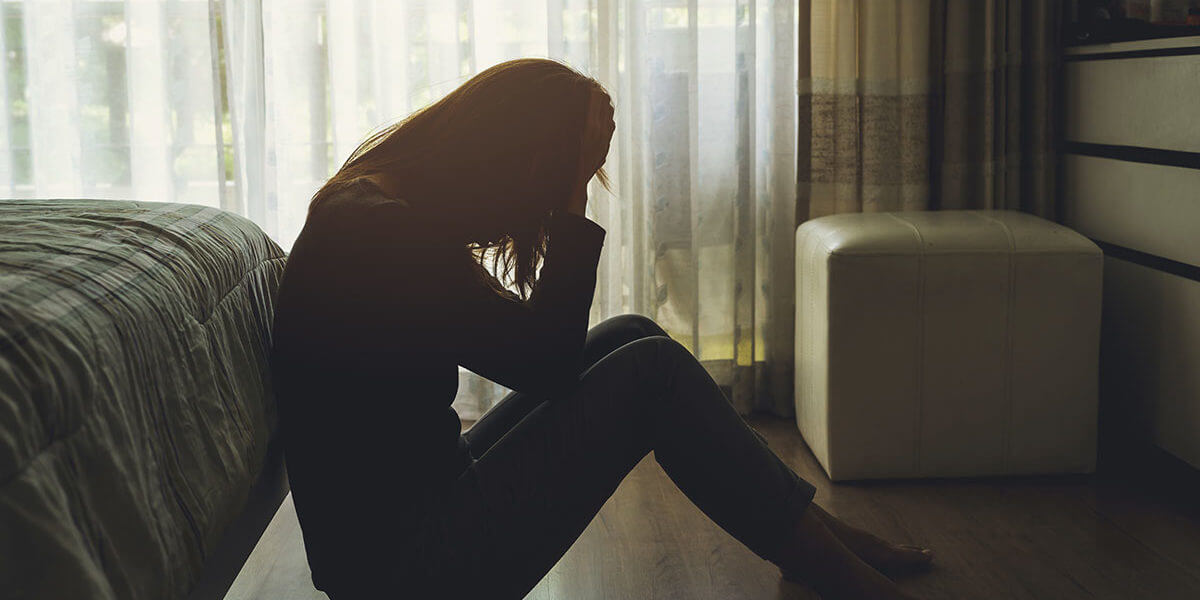Anxiety is one of the most commonly diagnosed mood disorders in the world today. Nearly twenty percent of the population in America is diagnosed with anxiety, and in more severe cases, those struggling with anxiety may need to seek treatment. Moreover, a person’s tendencies toward anxiety could put them at risk for substance use and subsequently addiction. Additionally, in the age of the COVID-19 virus, mental health experts worldwide have seen a significant increase in anxiety disorders and substance abuse in the past year.
At Crossroads Maine, we are here to help women with anxiety and substance use disorders. Preventive measures and early intervention can equip women with tools, coping skills, and resources before addiction occurs. To learn more about our treatment services, contact us today at 877.978.1667.
The Connection Between Anxiety and Substance Use
Women with anxiety disorders may find that alcohol or other substances can make their anxiety symptoms worse. In fact, they are two to three times more likely to have an alcohol or other substance use disorder at some point in their lives than those without anxiety. One disorder’s symptoms can make the symptoms of the other worse. For instance, an anxiety disorder may lead to using alcohol or other substances to self-medicate or alleviate anxiety symptoms. Unfortunately, self-medication often leads to alcohol or drug dependence and addiction.
The co-occurrence of substance abuse, particularly alcohol abuse, is common among women with a social anxiety disorder. Alcohol or drugs can also often cause panic attacks, and having a panic disorder is a risk factor for relapse among people with a substance use disorder.
Symptoms of Anxiety
Anxiety is characterized by fear and uneasiness, usually caused by the thought of an upcoming event or feeling that something undesirable may occur. The specifics and triggers differ from case to case, but general anxiety disorders originate from potentialities and may include:
- Panic attacks
- Extreme, and sometimes sudden, emotional changes
- Heart palpitations
- A fear or phobia of people, places, objects, or events
- Increased heart and breathing rate
- Nausea
- Dizziness
- Sweating
- Tenseness
- Inability to concentrate
Some or all of these symptoms may be present in somebody struggling with anxiety. However, the severity of them is going to differ. None of the symptoms are life-threatening. However, they can negatively impact your overall quality of life and ability to function and encourage a woman to self-medicate to alleviate them.
Treatment Options for Anxiety and Substance Use Disorder
Treating substance use disorder will not eliminate an anxiety disorder, and vice versa, so it’s necessary to treat both conditions together, mainly to lessen the chance of relapse. A dual diagnosis treatment program can help you manage anxiety and substance use or abuse. A team of professionals will work with you to understand the specific diagnosis and develop a treatment plan best suited to get you on the road to recovery.
Many people battling anxiety and substance abuse are reluctant to seek treatment due to the ongoing pandemic. However, at Crossroads Maine, we’re committed to following all of the CDC guidelines, and we will do what we can to ensure your safety throughout the treatment process.
Contact Crossroads
At Crossroads Maine, we understand the importance and value of treating anxiety and substance use disorder together. With more than fifty years of experience treating co-occurring disorders, our experienced, compassionate mental health professionals have developed programs and services to meet every woman’s unique needs for treatment in our residential treatment facility, including:
- Cognitive-behavioral therapy focuses on identifying, understanding, and changing thinking and behavior patterns.
- Dialectical behavior therapy brings to light opposing forces such as acceptance and change and reconciling the two emotions.
- Individual therapy programs, which is also called talk therapy
- Psychotherapy
- Recreational activities such as yoga therapy, equine therapy, and acupuncture therapy
At Crossroads Maine, we believe in individualized recovery plans to help our residents overcome a dual diagnosis in a warm, home-like setting. More than anything, we want women to succeed in their recovery and work toward life-long sobriety. Contact the caring professional team at Crossroads at 877.978.1667 to learn more today.


















